The Boston native punk/hardcore band transformed their sound into slowcore/emo and never looked back. The album is an underground masterpiece of the fledging slowcore genre and is one of Karate’s most popular albums. “There Are Ghosts” and “The Same Stars” are in Karate’s top three most streamed songs. It marks a shift in Karate’s identity from sound to members and perfectly leads into their most ambitious album, Unsolved.
After their debut self-titled album, Karate added Jeff Goddard on bass for In Place Of Real Insight. Former bassist Eamon Vitt moved to guitar to give Karate a dual guitar attack on that record. Vitt would end up leaving the band to pursue medical school before The Bed Is In The Ocean, so Karate would revert back to being a trio.
Lead singer and guitarist Geoff Farina’s poetic lyrics and delivery make Karate stand out from the pack. He uses spoken word on most of the songs except for the occasional yelling in high energy moments. The instrumentals are what stands out about the album. Karate are the masters of the buildup. Most songs start out slow and quiet with bass picking and the cymbal used to move the song along. The anticipation builds like a tea kettle until it eventually boils over into loud and skillful compositions.
“The Same Stars” and “Up Nights” are prime examples of this buildup style, but it’s done on the majority of songs on the album. Even songs that don’t have this climax like “Fatal Strategies” and “Bass Sounds” feel like their leading to that point. Karate also does a fantastic job and differentiating every song. Farina was inspired by music that molded genres together as a child, and you can hear those influences and genre mixing in every song. Some songs are more indie rock like “Outside Is The Problem,” while other songs like “Diazapam” go full punk.
The album does a fantastic job at giving off the feeling of dread and introspection. Farina sounds like he’s giving a soulful lament on the majority of songs, questioning his surrounding and way of life. A lot of this feeling is given by the instrumentals. “Not To Call The Police” is loud and drawn out from the start. Pairing it with Farina’s mellow to screaming vocals leaves listeners on the edge of their seat. The final guitar solo on “There Are Ghosts” plays with the fear that Farina has been singing about in the lyrics and gives a sinister spook down the spine.
Farina does a masterful job at building paranoia throughout the album. His lyrics leave the listener craving for context and feel like they come from a man who’s dealing with the idea of life itself. Farina is having an identity crisis on the record, and it comes out through his lyrics and delivery. He’s a man who just wants answers but leaves the listener with more questions.
The album repeatedly talks about change, whether that be good or bad. In “The Same Stars,” Farina tells a story of being stuck in a town but also the comfort in that. He sings, “God don’t make things that you can rearrange. But that’s okay, because I can’t take the change.” This song sets the mood for how Farina feels about change and introduces the word rearrange/arrange, which is used repeatedly in multiple songs.
“There are Ghosts,” “Diazapam,” “Bass Sounds,” and “Fatal Strategies” all talk about change and movement or the lack thereof. Ironically, both “Bass Sounds” and “Fatal Strategies” talk about things being changed and rearranged repeatedly, almost as if it’s a good thing. A complete contradiction of “The Same Stars.” In “Fatal Strategies” Farina sings “When things get strange, we just rearrange.” This only adds to the identity crisis that Farina has throughout the album.
But it’s not just Farina’s singing that’s having an identity crisis, it’s the instrumentals too. Some songs are completely thought out while others feel unfinished. I can see the shift in Karate’s mind as they start to play into the experimental jazzier sound they play in Unsolved. Songs like “Bass Sounds” feel like it’s leading to a destination it never reaches. The first half of “Fatal Strategies” has lyrics, but the second verse is nonexistent and feels barren as the band plays towards an unknown goal. It kinda works though, as the lyrics talk about rearranging and the band does just that, eliminating the lyrics in favor of instrumentals.
Overall, this album is an unknown classic. Three musicians who jump genres and are at the top of their game musically. I can’t think of many other groups whose sound is as fluid as Karate. They flow so well together and know exactly what they want to say on this album. Songs like “The Same Stars” and “Up Nights” are first versions of the sound we would eventually hear on the jazz influenced Unsolved. 25 years later and this album still sounds fresh like it did in 1998. As Karate would go more towards a jazz/funk direction with latter albums, this album is an interesting time capsule into a point between their punk roots and their jazz future. A time when they truly became slowcore legends, rearranging and changing along the way.



